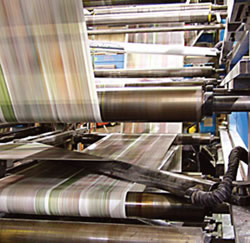 Western European business has spent the last 15 years storming into the east to buy and set up newspapers, magazines and television stations in a hunger for profits from an industry that lacked professionalism and freedom for nearly 50 years.
Western European business has spent the last 15 years storming into the east to buy and set up newspapers, magazines and television stations in a hunger for profits from an industry that lacked professionalism and freedom for nearly 50 years.
They are bringing in modern equipment and market forces to dictate the success or failure of the press.
But, with few exceptions, they are not coming to Romania.
Ignored by many of the western media giants active in eastern Europe, Romania has three homegrown media empires lead by three powerful figures: Adrian Sarbu, owner of MediaPro, Conservative Party (PC) leader Dan Voiculescu, who has influence over the Intact media empire and now Sorin Ovidiu Vantu, co-founder of an investment fund that lost the savings of hundreds of thousands of Romanians, who owns the Realitatea Group.
This Autumn there will be two news wire agencies fighting it out to be first to the news – both of which will be in the hands of two of these three figures, Vantu and Sarbu.
All of these groups are extending their reach with purchases of independent newspapers or the setting up of new TV networks.
Meanwhile, every other Romanian business leader and his mother seems to want to set up their own television station.
But none of this makes financial sense.
The media makes money from advertising and the size of the industry is larger than the capacity to absorb a limited ad revenue: around 300 million Euro is available for an estate of daily and weekly newspapers, magazines and television stations that eclipses most western European countries in its scope.
Therefore, there are question marks over why business people are entering an overcrowded market – especially when foreign groups have little interest in the sector.
The magazine market has a few European-wide owners but only one international group – Swiss Ringier – has a significant presence in Romania – with dailies Evenimentul Zilei and Libertatea. German giant WAZ has only one paper, Romania Libera, while EMI Deutschland has recently picked up regional paper Ziarul de Iasi.
This is not many.
Media companies are scared of Romania. The previous Government wielded strong influence over the press and TV. This was either through direct ownership of the media or by suspending debts to the state that media groups had assumed - in return for benign news coverage about Government activity.
While in the regions, local press barons exercised massive control over the press – and there are still unresolved cases of journalists being beaten up and, in some cases, potentially killed.
Newspaper and, especially, television reportage before the elections in 2004 was, with a few exceptions, ingratiating to the Government – confident that the opposition could not win.
When the DA Alliance was victorious, the media found itself in a contradictory position. It had backed the wrong horse – but had somehow won the race.
Political influence over large swathes of the media was suddenly lifted.
Last year saw an increase in informed stories about political matters – a more balanced and fair analysis of the political scene.
But now, the danger for the media does not come from the Government – but from itself.
This includes a consolidation of the media in the hands of three owners. This is not a concern if the bosses guarantee editorial freedom and independent agencies can verify that this has occurred.
This sector also needs more professionalism, training and responsibility.
It requires a more radical and coordinated right to association from journalists themselves – so that they can ensure they have the freedom to research, investigate and publish stories that the public, politicians and the private economy may not want to know, but need to view.
Michael Bird
